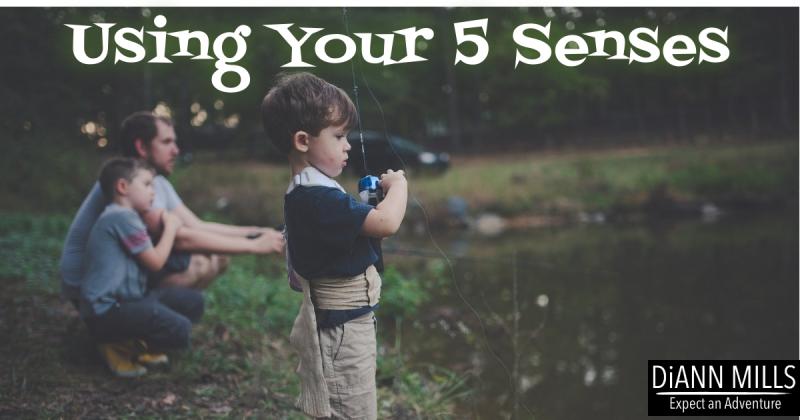
"Using sensory perception to enhance writing helps the reader retain the story."
“The beginning of human knowledge is through the senses, and the fiction writer begins where human perception begins.” Flannery O’Connor
Sensory perception sends an invitation to the reader: “Come join my story adventure!” The writer uses action, dialogue, and figurative language—metaphors and similes—to show seeing, hearing, tasting, smelling, touch, and even intuition for the reader to identify with the character.
Experiencing the scene through the senses pulls in the energy of credibility, but only if the writer uses relational and understandable language that emerges from the real inner character.

Sight
Sight isn’t limited to physical vision but includes dreams, imagination or mental imagery, and the character’s perception of the object—depth, color, and detected light. When we see or form a goal, we have vision, often viewed as hope for the future. Consider a mirage or the phrase “it’s a figment of my imagination.”
The character filters what is seen, much like looking at life through a prism. Other factors contribute to sight: age, color blindness, mental aptitude, and the health of the eye. What we see or don’t see impairs judgment and a perception of reality. Our characters face the same victories and challenges when they step into their reality.
Sound
Sounds are soft, loud, shrill, pleasant, unpleasant, or frightening. Sometimes a mixture. Like sight, characters interpret sounds and make emotional associations with them through their life filters. Writers use the familiar to bring the unique sound to life and provide an opportunity for the reader to feel a kinship.
The gentle tone of a father’s voice soothes a child, but the same words spoken in a harsh tone translate into anger or fear. What does the character hear and what emotional response do they form?
Use caution with onomatopoeia, a means of using a word that imitates the action. Poetry and some fiction may benefit from the technique, but it often emphasizes telling instead of showing. A few onomatopoeia words to avoid: slam, crash, bang, pow, wham, splat, and buzz.
Smell
The sense of smell may be one of our most powerful senses and is linked to taste. A writer introduces a woman with a distinct cologne. Whenever the male character notices the smell, he associates it with beauty, charm, and grace. But if the woman shuns him, he comes to despise the scent.
We value the aroma of properly prepared food, fragrant flowers, herbs, and other growing things. Smells can also warn us of danger or potential hazards.
Memory is more closely associated with smell than with any of the other senses. Think back to a time when a unique odor triggered a pleasant, unpleasant, or forgotten memory.
A character who has lost their sense of smell suffers physically and mentally. Like us, our characters respond to smell according to personality, preference, and life experiences.
Touch
Touch invites intimacy more than any of the other senses. Young children want to touch everything. They determine characteristics about the external world according to how their brains translate pleasant, painful, or non-exciting physical stimulation.
Texture is important not only to children but adults. Do you have a favorite pair of jeans? A soft T-shirt? What about a scratchy sweater?
The touch of someone we love is soothing, comforting, and a sensation we look forward to. But if that person or another physically hurts us, our memories store the information for the future.
Another, non-physical, trait of touch is the distance between the character and who is touching them. We can be touched verbally or mentally by a passionate speech in a room full of people or a one-on-one with the speaker.
Taste
We think of taste as sweet, sour, salty, bitter, spicy, and the list continues. As stated above, smell is linked to taste—apple pie, savory steak, freshly brewed coffee, bacon and eggs, and more.
Taste can also be linked to memories. Celebrations with exquisitely prepared food partners taste with memory and hope for the event to occur again. Tastes with positive associations—roasted turkey, mashed potatoes, gravy, and cranberry sauce at Thanksgiving, for instance—offer a pleasurable emotional link to those we love.
However, taste can usher in unpleasant memories, too. As a child, I attended a family reunion where hot dogs, corn on the cob, and watermelon filled my plate. On the four-hour drive home, I got sick. To this day, I refuse to eat those foods, because I associate their taste with getting sick.
Or imagine a feast of pizza for a team of high school football players before the big game. What usually stands for enthusiasm and a commitment to win can change drastically if the players fall ill to food poisoning. The memory of the taste of pizza can provoke an unpleasant emotional response.
Sixth Sense
The sixth sense is a perception beyond the basic five senses, one that can’t be seen, heard, smelled, touched, or tasted. The sensation is intuitive, a gut feeling without proof. Most of us have experienced that sixth sense and the strange sensation accompanying it. We’re not sure if the awareness is reliable, false, or a gift. Our characters experience the same undeniable perception.
Using sensory perception to enhance writing helps the reader retain the story. The writer uses proven methods to show and not tell the story. The scenes that incorporate these engine additives often increase the likelihood of the reader purchasing our next book and the next.
DiAnn Mills is a bestselling author who believes her readers should expect an adventure. She weaves memorable characters with unpredictable plots to create action-packed, suspense-filled novels with threads of romance. DiAnn believes every breath of life is someone’s story, so why not capture those moments and create a thrilling adventure?
Her titles have appeared on the CBA and ECPA bestseller lists; won two Christy Awards, Golden Scroll, Inspirational Readers’ Choice, and Carol award contests.
